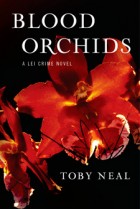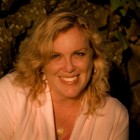On the Care and Feeding of Muses
By Toby Neal
 Your creative Muse is fed and cared for by a rich diet of sensory input, and time taken to fully experience life.
Your creative Muse is fed and cared for by a rich diet of sensory input, and time taken to fully experience life.
I woo my Muse by taking periodic, tiny “retreats.” It’s going to seem like cheating when I tell you I live on Maui, but I work a regular job and live a regular life, with work that gets tiring, a mortgage, and exceptionally high gas prices. Still, when I get out in nature, it really is amazing.
Today is an exceptionally clear, warm and gorgeous day at the park on the side of Haleakala. The ocean, glowing blue mystery, merges with the sky in the distance and holds the floating green/purple island of Lanai, and the striated majesty of the West Maui Mountains, draped in cumulus. I really do live in paradise.
I am in my little tent under the trees for an hours-long creativity retreat. The tent is an open container for me, making fragile definition of that which defies boundaries. The vista is so swelling and magnificent I shut my eyes for relief from it, my perception overwhelmed. I am anchored here, pointed out into vast space.
With my eyes shut I hear the singing of the meadow larks, and the rustling of wind in the invasive black wattle, rumble of some far-off construction equipment, the bark of a distant dog. I smell the slight mustiness of the tent, carelessly bundled away by the kids on their last camping trip, and the faint sweetness of the wattle bloom.
The afternoon clouds are beginning to gather, and cool wind, the same wind that gyrates and swirls the paragliders in bright arcs above me, reaches in and touches my cheek, soft and kind. I feel restfulness creeping over me, the need to sleep that usually comes over me first thing when I arrive for my “date” with my Muse, as if slipping the bonds of my hectic life is so exhausting that the first thing I can do when I’m free is fall asleep- and wake up with my Muse awake within me.
She’s my creative self, and while she doesn’t mind being disciplined and on a schedule, she likes it best when I make time for her, feed her with beauty, nurture her with praise, and present her with the occasional rose.
Do I need to think of her this way? Do I even need a Muse at all? No. But it’s more fun to have one, a useful mental construct. Externalizing and personalizing a source of creativity is a way of removing performance anxiety. (Elizabeth Gilbert explores on her Ted Talk video of 2011, check it out on YouTube.)
Muse or no muse, creativity flows from depth of exposure to sensory input. Let me say that again: creativity flows from depth of exposure to sensory input.
Without sounds we’ve known, where would music come from? Without images we’ve seen, colors we’ve boggled at, shapes we’ve felt, where would new works of art come from? And, without stories, legends, fairy tales, poetry, and even journal articles, where will original narrative spring from?
New work arises from the bones of old—just as new life arises from a remix of DNA.
With a dearth of exposure, how can new ideas emerge? In a hectic, overstimulated world with too much of one kind of input (like electronics) from whence will rise the next Michelangelo? Without time—time to wander, and putter, and percolate on rich sensory input, who could give birth to genius?
And by this, I’m not talking about retreating for six months to Esalen in Big Sur, meditating naked—(though that could be fun) I’m talking about walking in nature for awhile, letting the eyes wander where they will, picking out the butterflies trying to fly while they mate (not graceful) and the mynah bird hopping on a roof.
Breathe deep that smell of moss under a tree, a scent like the underside of a mushroom, cool and slightly sour.
Listen to rain falling, the parrot next door saying “Pretty bird!” Cars honking. Kids splashing in the neighbor’s pool.
Take a shower, feeling water define every nubbin and hair, watch it purl away between toes. Touch a loved one, really taking in the sensations. Roll around in fresh linens. Aah, touch.
Process all that information from each of your senses. Something will emerge later from what is deeply felt and fully experienced. They say write what you know—and if you aren’t fully occupying your own skin, inhabiting your own environment in a conscious way, ideas and descriptions will be forced, wooden. The Muse is a creature that is wooed rather than forced, and when fed and cared for properly by conscious living, she’s much more liable to come sit beside you and play—because nothing she does feels like work—and what you together write out of the richness of sensory input is going to be quality.
Try it and see. Write about all those little moments as they happen. Carry a notebook for a day and try to notice, really notice, everything that’s happening. You’ll be surprised by its power—and you’ll have the added benefit of never regretting a moment of your life lost to distraction and never fully experienced.
**
Toby Neal was raised on Kauai in Hawaii. She wrote and illustrated her first story at age 5 and has been published in magazines and won several writing contests. After initially majoring in Journalism, she eventually settled on mental health as a career and loves her work, saying, “I’m endlessly fascinated with people’s stories.”
She enjoys many outdoor sports including bodyboarding, scuba diving, beach walking, gardening and hiking. She lives in Hawaii with her family and dogs.
Toby credits her counseling background in adding depth to her characters–from the villains to Lei Texeira, the courageous and vulnerable heroine in the Lei Crime Series.


